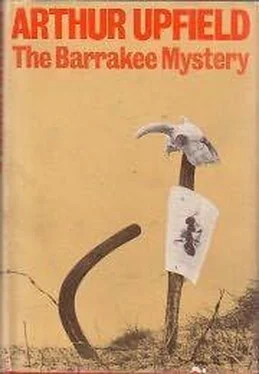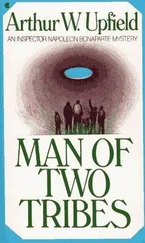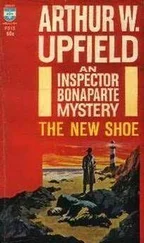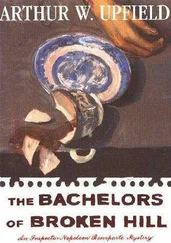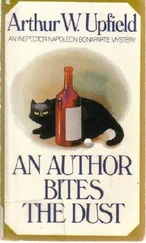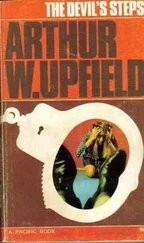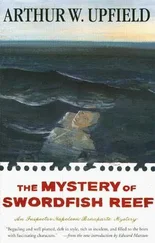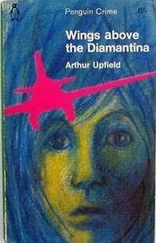Arthur Upfield - The Barrakee Mystery
Здесь есть возможность читать онлайн «Arthur Upfield - The Barrakee Mystery» весь текст электронной книги совершенно бесплатно (целиком полную версию без сокращений). В некоторых случаях можно слушать аудио, скачать через торрент в формате fb2 и присутствует краткое содержание. Жанр: Классический детектив, на английском языке. Описание произведения, (предисловие) а так же отзывы посетителей доступны на портале библиотеки ЛибКат.
- Название:The Barrakee Mystery
- Автор:
- Жанр:
- Год:неизвестен
- ISBN:нет данных
- Рейтинг книги:4 / 5. Голосов: 1
-
Избранное:Добавить в избранное
- Отзывы:
-
Ваша оценка:
- 80
- 1
- 2
- 3
- 4
- 5
The Barrakee Mystery: краткое содержание, описание и аннотация
Предлагаем к чтению аннотацию, описание, краткое содержание или предисловие (зависит от того, что написал сам автор книги «The Barrakee Mystery»). Если вы не нашли необходимую информацию о книге — напишите в комментариях, мы постараемся отыскать её.
The Barrakee Mystery — читать онлайн бесплатно полную книгу (весь текст) целиком
Ниже представлен текст книги, разбитый по страницам. Система сохранения места последней прочитанной страницы, позволяет с удобством читать онлайн бесплатно книгу «The Barrakee Mystery», без необходимости каждый раз заново искать на чём Вы остановились. Поставьте закладку, и сможете в любой момент перейти на страницу, на которой закончили чтение.
Интервал:
Закладка:
“The Central Australians employ the last two-the Kirras for throwing and the Murrawirrie for use as a sword. You see, therefore, that the Kirras is, or was, in general use all over Australia; but there is a sharp difference in the carving. The eastern blacks always flattened one side; the Central Australia blacks never flattened either side, but kept the weapon round.
“Now, a Kirras made that wound. The boomerang was round, indicating that it came from Central Australia. It was thrown at a range of about thirty yards. Had it struck King Henry’s head fair and square, it would have smashed it to pulp; had it reached him from a distance of a hundred and fifty yards, it would have killed him by cutting his head open. Having a description of King Henry’swound, I am inclined to reason that it was not the boomerang in flight that killed him.”
“Well?” The squatter was astonished, and showed it.
“To proceed,” Bony went on. “The weapon which made that mark I have proved came from Central Australia. From tip to tip it measured about thirty-three inches, and it probably weighed about two pounds. Without seeing the weapon, I can go farther. I can tell you the precise district in Central Australia from which it came, and the name of the tribe that made it. It is not a sharply-curved boomerang. On the outer edge, at equal distance from the centre, are two deep incisions cut diagonally; and those marks-which show in reverse on the tree there-were cut as a mark of respect to an ancient chief who, hugging two enemy warriors in the sameembrace, crushed them to death.”
For a little while Mr Thornton regarded Bony with undisguised admiration. “What else does that wound tell you?” he asked.
“That the thrower of the boomerang was not skilled in its use,” replied Bony promptly. “A practised hand would never have missed at thirty yards, even in the dark. But enough of boomerangs for a while. Have you the list of names I asked for?”
“Yes. Here it is.”
Bony glanced down the names written on foolscap, the occupation of each person being also given.
“Are all these people still about the homestead?” he asked.
“All but Blair and McIntosh, who are out on the run cleaning out a dam, and my son, now at ThurlowLake. ”
The half-caste’s expression was inscrutable; his blue eyes veiled. From a pocket in his dungarees he produced a silver pencil-holder and, kneeling beside the packing-case, used it as a desk. He added another name to the list, saying:
“John Thornton.”
“Surely I am not suspect?” inquired the station-owner dryly.
Bony looked up. “I am looking for a sting-ray,” he said. “I examine all the fish that come into my net to make sure if the sting-ray is there. There is a Mrs Thornton, is there not?”
The squatter laughed heartily.
“There is,” he admitted.
Down went Mrs Thornton’s name, and then yet another was added.
“And a Miss Kate Flinders, I believe,” Bony murmured. Once more on his feet, he said: “I have here the name of every person at Barrakee homestead the night King Henry was murdered. I also have a list of the blacks up along the river. Our friend, the sergeant, definitely ascertained that there was not a single traveller on either side of the river for a distance of twelve miles up and twelve miles down on that precise night. Therefore, one of the names on my list is the name of King Henry’s murderer.
“The case is one of exceptional simplicity,” Bony went on, with astounding assurance. “I have to find the killer among only twenty-four people. My confreres in the city have to find a wrongdoer among hundreds of thousands, which is why they often fail and I never do.
“Adopting my original and exclusive methods of detection, I shall proceed to take a name and prove the innocence of the owner by inductive reasoning. With this process of elimination there will in the end remain one name-the name of King Henry’s murderer.”
“You make me nervous, my friend,” Thornton said. “I shall have no peace of mind till you tell me you have erased my name.”
“Then I will tell you when I do.”
“Thank you! Here is my wife, curious to know why we are conspiring here.”
Mrs Thornton and her niece were walking across the billabong. Bony regarded them with keen eyes. To him they were fish in his net, and either might be the sting-ray. When near, the Little Lady looked at him kindly; Kate with interest. The squatter smiled, and said:
“I am having the boats painted, dear. Not, I am afraid, before it was needed.”
“You are right, John. They need it very much. Kate and I were walking in the garden, and your long conversation has made us curious.”
“My dear, you should not be curious,” admonished her husband. Turning to the half-caste, he said: “This is a new hand, with the exceptional name of Napoleon Bonaparte.”
“Napoleon Bonaparte!”Mrs Thornton echoed.
“Madam, it is my regret that I am not the illustrious Corsican,” Bony said gallantly. “It is my regret that his name has been taken in vain by those who gave it me. Alas! no man can be responsible for his parents: I certainly was, however, responsible for my name, though I was but six months of age.”
Bony described his christening, following the mutilation of Abbott’s famous history.
“I hope you have read that history,” the Little Lady said, looking at the dark face, the blue eyes, and the sharp features of the new hand.
“If I had read the Bible through as often as I have read that history, Madam, I should today be a Doctor of Theology.”
Two tiny vertical lines appeared between Mrs Thornton’s eyes. Before her stood a gentleman in dungarees, an Australian half-caste with the manner and accent of a university man. Bony was something entirely new to her.
“In that case,” she said, “you will always experience poignant sympathy with the Eagle of France chained to the Dreadful Rock.”
“Madam,” he said in return, “it was an unspeakable tragedy. My ancestors on my mother’s side knew not Christ, but they were better Christians than the Emperor’s jailers.” For a moment the squatter’s wife and the half-caste gazed steadily at each other. Then Bony bowed with instinctive grace, waited for the ladies, escorted by the squatter, to move away, and finally sat down on the upturned boat and lit a cigarette.
For several minutes he remained in deep thought, smoking pensively. Suddenly he produced a small diary and, opening it at the page marked with that date, he wrote: “Mrs Thornton, capable of strong emotion.”
Chapter Thirteen
Mrs Thornton’s Ambition
A WEEK PASSED with accustomed quietude at Barrakee. The river had almost ceased to run, and the long shallow stretches between the holes at every sharp bend were dry, with the exception of a meandering runnel. The days were brilliant and deliriously cool after the fierce heat of summer; and the nights, clear and invigorating, were lightened by the winking lamps of Heaven, so bright and big as seemingly to be affixed to the topmost branches of the gums.
Bony fell naturally into his place among the men, and with them quickly became a favourite. If at first his correct and somewhat magniloquent speech aroused comment, this single peculiarity was quickly dimmed by familiarity. His supply of stories was unfailing, and his wonderful accomplishment of eliciting haunting strains from a single gum-leaf was an inexhaustible source of pleasure.
A few days after Bony’s arrival Sergeant Knowles called in for afternoon tea on his way from the little township of Louth. Ranking much higher in the social scale of the bush people than do his peers in the British police force, the sergeant was always welcomed by the Women of Barrakee.
Читать дальшеИнтервал:
Закладка:
Похожие книги на «The Barrakee Mystery»
Представляем Вашему вниманию похожие книги на «The Barrakee Mystery» списком для выбора. Мы отобрали схожую по названию и смыслу литературу в надежде предоставить читателям больше вариантов отыскать новые, интересные, ещё непрочитанные произведения.
Обсуждение, отзывы о книге «The Barrakee Mystery» и просто собственные мнения читателей. Оставьте ваши комментарии, напишите, что Вы думаете о произведении, его смысле или главных героях. Укажите что конкретно понравилось, а что нет, и почему Вы так считаете.
